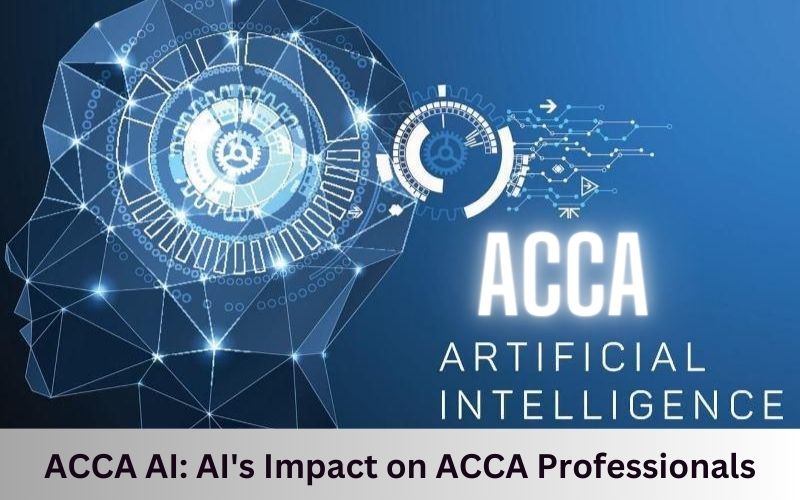Concurrently, AI integration occurred in modern financial and accounting process, this is by considering how this presented one of the most issues widespread today. ACCA which generally includes expertise in financial management and reporting available on the market is moving through major alterations of role and responsibility. Let’s have a close look at AI and how it innovates the field for ACCA professionals and what does it mean for their future of the product.
The AI Impact on Accounting – The Saga of AI.
Embracing Automation
AI-enabled tools capable of performing the recurring duties including data entry, reconciliation and some of the compliance requests will free up CAC staff to concentrate on the strategic decisions.
Enhanced Accuracy
Machine learning algorithms by deep diving the huge data sets as fast and precisely as warranted, making errors in financial reporting and predicting figures minimal.
Advanced Analytics
AI provided ACCA professionals with an opportunity to access such complex financial data and to extract vital insights and guide their daily activities by providing data-driven decisions that are very accurate.
Challenges and Opportunities
Skill Enhancement: ACCA members should be prepared for technological advancements by acquiring necessary skills such as data analytics, programming, and AI implementations to ensure their competitiveness in the ever-changing finance arena.
Ethical Considerations
Gradually, AI seems more and more indispensable in financial activity; an ACCA professional has to be well-versed in the ethical dilemmas that involved data privacy, bias and accountability.
Job Evolution
ACCA members will continue to be involved in the AI-assisted accounting processes since these technologies, although they do away with the routine accounting tasks, still open up new areas like AI auditing, risk assessment, and advisory services.
Fraud Detection and Prevention
The banks who give their preference to employ AI tech alongside with the financials have a chance to spot red flags with suspicious transactions which may ruin their whole business. Through analyzing enormous volumes of data with regard to time in a real-time manner AI systems can identify any irregular transactions, bringing the risk of financial losses significantly down for the organizations and businesses.
Compliance and Regulatory Reporting
AI facilitates compliance processes through the characteristics like watching for changes in regulations by itself and quickly changing reporting procedures to be in line with the new regulations. ACCA experts can use AI powered solutions for the purpose of assuring observance of the complicated legal framework and hence reduce probability of receiving penalties for non-compliance.
Predictive Financial Modeling
AI assists ACCA experts in the creation of sophisticated mathematical models, preventing changes in financial forecasting. AI algorithms that rely on historical data analalysis and trends forecasting provide trustworthy forecasts concerning the future financial performance. This, in turn, leads to sound strategic decisions implementation.
Cost Reduction and Efficiency
Hence as the impact of artificial intelligence in accounting process is accrued, it not only results in the reduction of cost but also increases operational efficiency. Although these professionals automate repetitive tasks like invoicing, categorization of expenses and management of pay roll, this enables sourcing of resources more efficiently and focusing them on only meaningful activities.
Enhanced Client Services
With ACCA implementing AI-powered analytics capability, professionals in ACCA can now give their clients the best financial advice and insights tailored specifically to them. Through a data-driven criteria, ACCA could bring out finance professionals with efficient resources and strategies, such as increasing client portfolios, managing their risks, and taking advantage on emerging opportunities for their clients, which leads to stronger client relationships and commitments.
Real-Time Financial Insights
AI in particular allows ACCA professionals obtain immediate accounting KPIs helpful in decision making. Through the continuous gathering and analyzing of vital performance measures and financial metrics, organizations will be able to spot emerging tendencies, discover growth horizons and prevent negatives, and therefore, enable stakeholders to take timely decisions and make the necessary strategic modifications.
Scalability and Adaptability
AI-powered accounting solutions are cost-effective, scalable, and flexible toward business units and organizations as their requirements/demands continue to evolve. AI technological capabilities can accommodate any type of accounting intensive operations, whether it is small or complex multinational enterprises, and the incoming or outgoing work flows and requirement are variable in nature, making it flexible and scalable.
By integrating the AI into the accounting, ACCA professionals can be forward-minded to explore ways of changing the playing field, developing efficiency, and creating significant value across organization’s financial operations that cannot be done by other experts but through the incorporation of AI acts as a game-changer in this digital age.
FAQs
What will the AI development mean for ACCA job editions?
AI will change job roles what means that ACCA professionals will have to upgrade their skills in data analytics and AI adoption in order to stay marketable in the future market.
Which ethical controversies may ACCA professionals face as a result of AI adoption?
The ACCA professionals have to, thus, know how to handle issues involving data privacy, diverse influence of algorithm biases, and how to be transparent in AI-driven decisions.
AI is one of the technologies that will impact the role of the ACCA professionals. So, how will they adapt to the AI technology?
ACCA professionals have to re-equip themselves by constant updating on the use technologies such as data analytics, programming and AI implementation and also be abreast with the latest in industry modernization and best practices.
What is the future of the ACCA Certified Professional with the advancement of AI (artificial intelligence)?
AI automates repeatable tasks whereas ACCA professionals’ contribution in financial analyzing, strategic decision-making, and ethical issues are non-replaceable, establishing the latter as future of AI technologies.
Is AI a good chance for ACCA professionals or not?
AI paves a way for ACCA practitioners in AI auditing, risk appraisal, advisory role and strategic financial planning which could be integrated to deliver add on value to their clients and company.
Embracing the Future
With AI still at a relatively nascent stage, ACCA personnel must be involved in the ongoing technological development as well when ethics and professional skills are being upheld at the same time. Through the application of AI-driven tools as well as by utilizing data analytics to the max, ACCA professionals can look into the murky waters of the current financial arena fearlessly and confidently, always staying relevant and up to par with digital-driven changes.
If you want to read more informative blogs then follow AI Indies.




